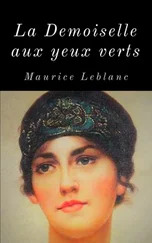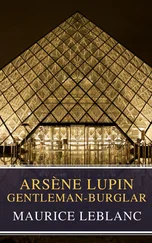"Here! Stand here!" cried Lupin, raising his voice. And he caught the policeman's arm, and hustled him roughly to the front of the doors of the lift-well. "Do you see these doors? Do you see them?" he snapped.
"Yes, yes," said the policeman, glaring at them.
"They're the doors of a lift," said Lupin. "In that lift are Dieusy and Lupin. You know Dieusy?"
"Yes, yes," said the policeman.
"There are only Dieusy and Lupin in the lift. They are struggling together. You can hear them," shouted Lupin in the policeman's ear. "Lupin is disguised. You understand—Dieusy and a disguised man are in the lift. The disguised man is Lupin. Directly the lift descends and the doors open, throw yourself on him! Hold him! Shout for assistance!" He almost bellowed the last words into the policeman's ear.
"Yes, yes," said the policeman. And he braced himself before the doors of the lift-well, gazing at them with harried eyes, as if he expected them to bite him.
"Be brave! Be ready to die in the discharge of your duty!" bellowed Lupin; and he walked out of the room, shut the door, and turned the key.
The policeman stood listening to the noise of the struggle in the lift, himself strung up to fighting point; he was panting. Lupin's instructions were whirling and dancing in his head.
Lupin went quietly down the stairs. Victoire and Sonia saw him coming. Victoire rose; and as he came to the bottom of the stairs Sonia stepped forward and said in an anxious, pleading voice:
"Oh, M. Guerchard, where is he?"
"He's here," said Lupin, in his natural voice.
Sonia sprang to him with outstretched arms.
"It's you! It IS you!" she cried.
"Just look how like him I am!" said Lupin, laughing triumphantly. "But do I look quite ruffian enough?"
"Oh, NO! You couldn't!" cried Sonia.
"Isn't he a wonder?" said Victoire.
"This time the Duke of Charmerace is dead, for good and all," said Lupin.
"No; it's Lupin that's dead," said Sonia softly.
"Lupin?" he said, surprised.
"Yes," said Sonia firmly.
"It would be a terrible loss, you know—a loss for France," said Lupin gravely.
"Never mind," said Sonia.
"Oh, I must be in love with you!" said Lupin, in a wondering tone; and he put his arm round her and kissed her violently.
"And you won't steal any more?" said Sonia, holding him back with both hands on his shoulders, looking into his eyes.
"I shouldn't dream of such a thing," said Lupin. "You are here. Guerchard is in the lift. What more could I possibly desire?" His voice softened and grew infinitely caressing as he went on: "Yet when you are at my side I shall always have the soul of a lover and the soul of a thief. I long to steal your kisses, your thoughts, the whole of your heart. Ah, Sonia, if you want me to steal nothing else, you have only to stay by my side."
Their lips met in a long kiss.
Sonia drew herself out of his arms and cried, "But we're wasting time! We must make haste! We must fly!"
"Fly?" said Lupin sharply. "No, thank you; never again. I did flying enough last night to last me a lifetime. For the rest of my life I'm going to crawl—crawl like a snail. But come along, you two, I must take you to the police-station."
He opened the front door, and they came out on the steps. The policeman in charge of the car saluted.
Lupin paused and said softly: "Hark! I hear the sound of wedding bells."
They went down the steps.
Even as they were getting into the car some chance blow of Guerchard or Dieusy struck a hidden spring and released the lift. It sank to the level of Lupin's smoking-room and stopped. The doors flew open, Dieusy and Guerchard sprang out of it; and on the instant the brown- faced, nervous policeman sprang actively on Guerchard and pinned him. Taken by surprise, Guerchard yelled loudly, "You stupid idiot!" somehow entangled his legs in those of his captor, and they rolled on the floor. Dieusy surveyed them for a moment with blank astonishment. Then, with swift intelligence, grasped the fact that the policeman was Lupin in disguise. He sprang upon them, tore them asunder, fell heavily on the policeman, and pinned him to the floor with a strangling hand on his throat.
Guerchard dashed to the door, tried it, and found it locked, dashed for the window, threw it open, and thrust out his head. Forty yards down the street a motor-car was rolling smoothly away—rolling to a honeymoon.
"Oh, hang it!" he screamed. "He's doing a bunk in my motor-car!"
The Extraordinary Adventures of Arsène Lupin
ARSÈNE LUPIN VERSUS HERLOCK SHOLMES
BY
MAURICE
LEBLANC
Translated from the French
By GEORGE MOREHEAD
M.A. DONOHUE & CO.
CHICAGO
1910
CONTENTS
CHAPTER I.Lottery Ticket No. 514 CHAPTER II.The Blue Diamond CHAPTER III.Herlock Sholmes Opens Hostilities CHAPTER IV.Light in the Darkness CHAPTER V.An Abduction CHAPTER VI.Second Arrest of Arsène Lupin CHAPTER VII.The Jewish Lamp CHAPTER VIII.The Shipwreck
CHAPTER I.
LOTTERY TICKET NO. 514.
On the eighth day of last December, Mon. Gerbois, professor of mathematics at the College of Versailles, while rummaging in an old curiosity-shop, unearthed a small mahogany writing-desk which pleased him very much on account of the multiplicity of its drawers.
"Just the thing for Suzanne's birthday present," thought he. And as he always tried to furnish some simple pleasures for his daughter, consistent with his modest income, he enquired the price, and, after some keen bargaining, purchased it for sixty-five francs. As he was giving his address to the shopkeeper, a young man, dressed with elegance and taste, who had been exploring the stock of antiques, caught sight of the writing-desk, and immediately enquired its price.
"It is sold," replied the shopkeeper.
"Ah! to this gentleman, I presume?"
Monsieur Gerbois bowed, and left the store, quite proud to be the possessor of an article which had attracted the attention of a gentleman of quality. But he had not taken a dozen steps in the street, when he was overtaken by the young man who, hat in hand and in a tone of perfect courtesy, thus addressed him:
"I beg your pardon, monsieur; I am going to ask you a question that you may deem impertinent. It is this: Did you have any special object in view when you bought that writing-desk?"
"No, I came across it by chance and it struck my fancy."
"But you do not care for it particularly?"
"Oh! I shall keep it—that is all."
"Because it is an antique, perhaps?"
"No; because it is convenient," declared Mon. Gerbois.
"In that case, you would consent to exchange it for another desk that would be quite as convenient and in better condition?"
"Oh! this one is in good condition, and I see no object in making an exchange."
"But——"
Mon. Gerbois is a man of irritable disposition and hasty temper. So he replied, testily:
"I beg of you, monsieur, do not insist."
But the young man firmly held his ground.
"I don't know how much you paid for it, monsieur, but I offer you double."
"No."
"Three times the amount."
"Oh! that will do," exclaimed the professor, impatiently; "I don't wish to sell it."
The young man stared at him for a moment in a manner that Mon. Gerbois would not readily forget, then turned and walked rapidly away.
An hour later, the desk was delivered at the professor's house on the Viroflay road. He called his daughter, and said:
"Here is something for you, Suzanne, provided you like it."
Suzanne was a pretty girl, with a gay and affectionate nature. She threw her arms around her father's neck and kissed him rapturously. To her, the desk had all the semblance of a royal gift. That evening, assisted by Hortense, the servant, she placed the desk in her room; then she dusted it, cleaned the drawers and pigeon-holes, and carefully arranged within it her papers, writing material, correspondence, a collection of post-cards, and some souvenirs of her cousin Philippe that she kept in secret.
Читать дальше












